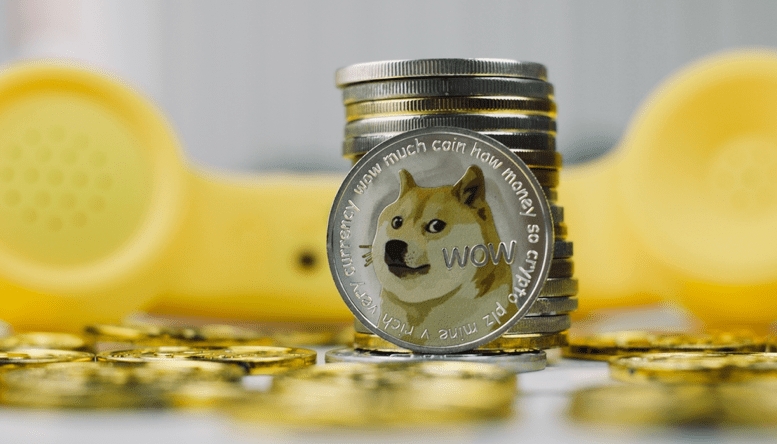In today’s Dogecoin mining guide, we will be showing you how to mine Dogecoin, the necessary requirements, and if the coin is still profitable to mine in 2019.
What Is Dogecoin?
Dogecoin is a crypto that was launched din 2013 by Billy Marcus and Jason Palmer. The coin resulted from a fork from Litecoin, and it features the cute Shiba-Inu dog, which is the face of the widely-popular “DOGE” memes.
Even if the coin was first created to parody the crypto community, it soon turned out to be much more than the creators had planned. It became a sensation on its own.
 Source: NameCoinNews
Source: NameCoinNews
Currently, Dogecoin is ranked as the 31st most successful cryptocurrency by market cap.
As Dogecoin is a fork of Litecoin, it also uses the Scrypt algorithm for mining. Unlike Bitcoin’s SHA-256, Scrypt mining does not consume as much computing power. Dogecoin mining is the process that rewards miners for verifying the new transactions that are added to the Dogecoin blockchain.
Back in 2014, Dogecoin and Litecoin had merged the mining process, which meant that you could mine both coins simultaneously.
While the coin can be traded and mined like other cryptos, DOGE is mostly associated with charitable donations and campaigns, or financing sponsorships.
Dogecoin has a faster processing time and block reward than Bitcoin, and it is less resource-intensive, but DOGE also has a much lower trading value than BTC or LTC. The current trading value of DOGE is $0.002206, with a market cap of $270,021,245.
The capped supply was initially 100 billion, but after a fork, the coin now has an infinite supply.
Technical details:
- Market Supply: infinite;
- Current Supply: approx. 122 billion (November 2019);
- Blocktime: 1 minute;
- Block reward: 10,000 per block;
- Inflation rate: 5.2 billion DOGE per year;
- Difficulty: 1,664,564.593;
- Mining Algorithm: DigiShield;
- Difficulty retarget: after each block;
- Consensus Algorithm: Scrypt.
Dogecoin Mining Requirements
Before we show you how to mine Dogecoin, you will need to have the following tools:
- A PC that supports either Windows, OS X, or Linux operating system. ASICs or GPUs may be required if you want to scale your mining operations;
- An internet connection;
- Mining Software;
- A wallet that supports Dogecoin. There are various types of Dogecoin wallets that you can use, mobile, web, cold, light, and full wallets. In order to mine Dogecoin, you will require a full node wallet called Dogecoin Core;
- Dogecoin mining pools. There are many pools that support Scrypt mining.
Dogecoin Mining: Solo vs Pooled
There are two ways of mining Dogecoin. The first method involves solo mining, meaning that you and your hardware are the only ones producing the hashing power, and you also get all the entire block reward resulted from your efforts.
 Solo mining is not profitable if you mine on a small scale, being more suitable for large-scale operations.
Solo mining is not profitable if you mine on a small scale, being more suitable for large-scale operations.
Many people from the community regard solo mining Dogecoin to be obsolete, as ASIC Litecoin miners have made the hash rate in Dogecoin mining so high that rewards are more of a side effect from mining Litecoin.
Pooled mining is a joint mining effort where miners combine their hashing power in mining pools to find the block reward faster and have a higher return on their investment. The block rewards are proportionately distributed among the members of the pool when a block is confirmed.
Using a Dogecoin pool means that you will have to pay fees. You will receive a small portion of the mined block. Also, pools mine blocks at a faster rate than solo miners, meaning you will have a higher chance of earning a reward even though it is a much smaller one.
Our advice on how to mine Dogecoin for beginners would be to use a Dogecoin pool, as it is more convenient from a time and hash rate perspective.
Solo mining comes with the risk of waiting a long time to confirm a transaction, as there are many miners with higher hash rates. You could be waiting for weeks or even months before you get a block reward. But, you will be the sole person that benefits from that reward.
Merged Mining
Merged mining is considered to be the most lucrative way of mining Litecoin through ASICs, as the same hashing power is also being used to mine on the Doge network.
Litecoin and Dogecoin both use Scrypt hashing algorithms, and this has enabled pools to support simultaneous mining of the two coins.
Dogecoin Mining Hardware
Dogecoin can be mined using the following hardware:
Here are some examples of ASIC miners:
- Innosilicon A2 Terminator;
- Bitmain Antminer L3;
- BW L21 Scrypt Miner.
Dogecoin Mining Software
Regardless if you are mining with ASIC, a GPU, or a CPU, you will have to install software to serve as an interface with the hardware. Also, you need to choose the type of software that is most compatible with your hardware.
Below we will feature some examples of software in our how to mine Dogecoin guide:
CPU: CPUminer is a free software miner for CPU users.
GPU: GPU miners have more software options:
- CudaMiner – most compatible with Nvidia products;
- CGminer – most compatible with GPU hardware;
- Easy Miner – good for beginners.
Scrypt ASIC miners:
- MultiMiner– ideal for Scrypt based currencies, like Litecoin and Dogecoin, but it can also be used to mine SHA-256 currencies like Bitcoin;
- CGminer and EasyMiner are also compatible with ASIC miners.
Dogecoin Mining Profitability
Given the current price of Dogecoin and the cost of setting up a mining rig, to mine this coin is not considered a very lucrative endeavor.
It is very difficult to make a profit by mining Dogecoin, especially if you opt to do it solo. You will most likely spend more money on electricity and hardware.
The best option would be to merge mine with Litecoin, as LTC has a higher market value, and you use the same hash rate to mine two coins.
 cryptocurrencynews.com
cryptocurrencynews.com
Conclusion
This has been our guide on how to mine Dogecoin. We hope that the information we provided will be of use to you in your Dogecoin mining endeavors.
Featured image: The Cryptonomist
Note: This post was originally published on 31 December 2018 and has been totally updated for the completeness and veracity of the content on 11 December 2019.
The post appeared first on Coindoo







